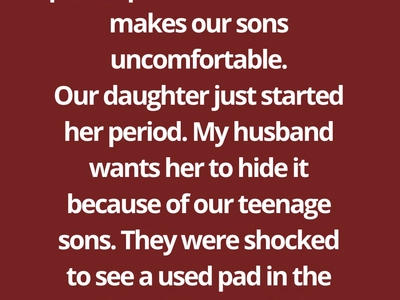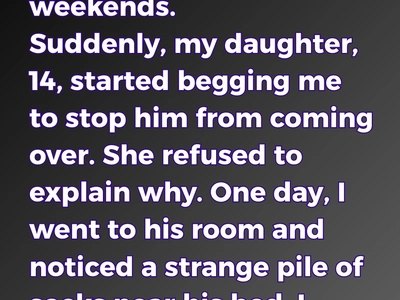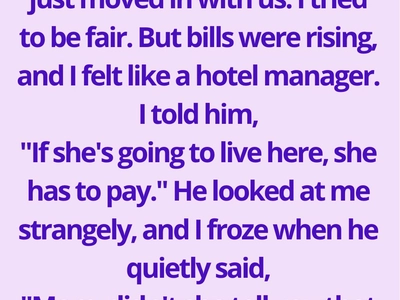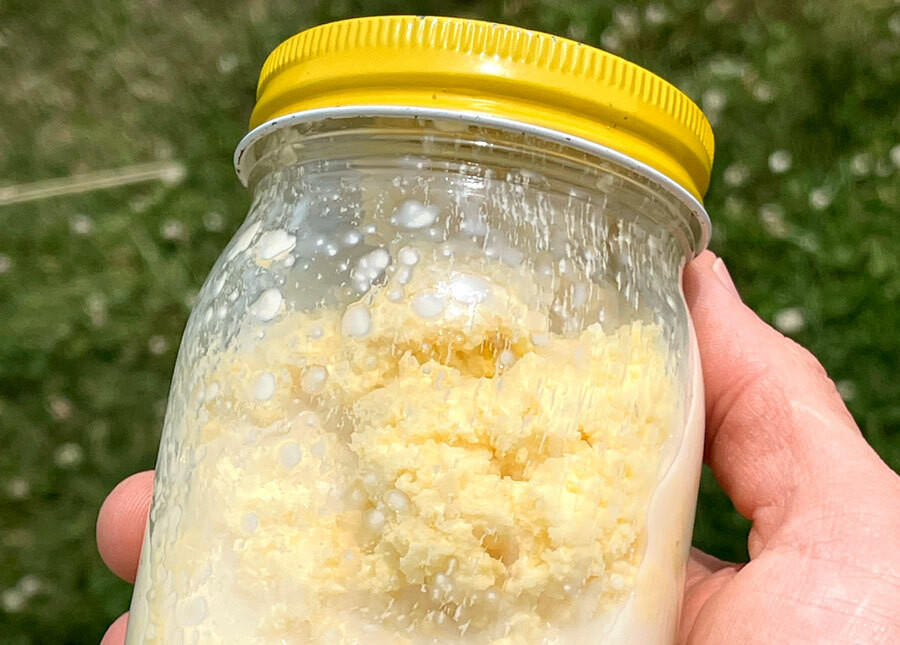When Shame Turned to Support: A Family’s Journey to Understanding
When our daughter got her first period, it was a big moment—one of those milestones you know is coming, but you’re never really prepared for until it happens. She was nervous but curious, shy but also proud in a quiet way. I could tell she was still figuring out what it all meant, both physically and emotionally. I remember the day clearly; she came to me with a soft, worried voice and said, “Mom, I think it started.” I hugged her and told her it was completely normal, that she wasn’t alone, and that this was just another step in growing up.
What I didn’t expect was how my husband and sons would react. When I mentioned it to my husband later that day, he frowned, not out of anger, but discomfort. “I don’t know,” he said slowly, scratching the back of his neck. “Maybe we should be careful about how much we talk about it around the boys.” I thought he was just being awkward, that he’d eventually adjust. But then he added something that stopped me cold: “She should probably keep her stuff hidden. Pads, tampons, all that—it might make the boys uncomfortable.”
At first, I laughed because I thought he was joking. But when I realized he was serious, I felt a mix of anger and disbelief. “Uncomfortable?” I asked. “Do you think she isn’t uncomfortable enough already? This is all new to her. The last thing she needs is to feel like she’s doing something wrong.” He shrugged, clearly not understanding the depth of what he’d just said.
A few days later, I noticed our sons acting strangely around their sister. They avoided sitting next to her, and one of them actually flinched when she asked him to pass the remote. It didn’t take long to figure out why. Apparently, they had seen a used pad in the bathroom trash and were “grossed out.” I overheard one of them whisper to the other, “That’s so nasty.” My daughter heard it too. I saw the way her face changed, the light in her eyes dimming just a little bit more.
That night, when she went to her room, she barely said a word. After dinner, I found her sitting on the edge of her bed, staring at her hands. Her eyes were red. She didn’t even look up when I came in. “I didn’t do anything wrong,” she whispered, “but they all look at me like I did.” My heart broke a little right then. She wasn’t crying because she was in pain—she was crying because she felt shame for something that should never bring shame.
I tried to comfort her, but what really got to me was what happened the next morning. My husband, thinking he was being “practical,” suggested that maybe our daughter should just “stay in her room” during her period so the boys wouldn’t feel awkward. He said it casually, like he was offering some kind of solution, but I could see our daughter freeze mid-bite at breakfast. Her fork clattered against the plate. The silence that followed was suffocating. She didn’t say a word, but her face said everything.
That was it for me. Something in me snapped—not out of rage, but out of pure protection. I looked at my husband and said, as calmly as I could manage, “We’re having a family meeting tonight.” He seemed taken aback but didn’t argue.
When evening came, I gathered everyone in the living room. The boys slouched on the couch, clearly confused about why they were being called in. My husband sat in his chair, avoiding eye contact. Our daughter hovered near the hallway, hesitant, unsure if she even wanted to be there.
I started softly, trying not to sound like I was scolding anyone. “We need to talk,” I said. “About something important.” I explained that our daughter had started her period and that it was a normal, healthy part of growing up. I looked at my sons. “You both will meet girls and women your entire lives—friends, classmates, partners—and many of them will go through the same thing. It’s not something to be scared of or disgusted by. It’s just life.”
They fidgeted, avoiding my eyes. My younger son muttered, “We just didn’t know what to do. It was…weird.” I nodded, appreciating his honesty. “I understand. It’s okay to feel uncomfortable at first,” I said gently. “But being uncomfortable is often a sign that we need to learn something, not hide from it.”
I motioned for our daughter to sit with us. She looked uncertain but came and sat beside me. I made sure she knew she had every right to be part of this conversation. “Your sister isn’t doing anything wrong,” I said. “She’s just growing up. You don’t have to avoid her. You don’t have to be awkward. What she’s going through is something every one of us should respect.”
There was a long pause. I could see the wheels turning in their heads, my husband’s included. I didn’t want to shame them—I wanted to open their eyes. I talked about empathy, about support, about how our reactions can make someone feel either safe or isolated. Slowly, the tension in the room began to shift.
My older son raised his hand awkwardly, like we were in a classroom. “So, like… it’s not dirty or anything?” he asked. I smiled. “No, it’s not dirty. It’s natural. It means her body is healthy and doing what it’s supposed to do.” He nodded, clearly relieved. My younger son looked thoughtful. “I just didn’t know we could talk about it,” he admitted. “It’s not something people really tell us.”
That was the moment I realized how little boys are taught about these things. They grow up in a world that tells them periods are “gross,” something to joke about or avoid. No one ever teaches them that this is a normal biological process that deserves respect. And then, when they become men, they carry that ignorance with them—sometimes turning it into shame or even cruelty without meaning to.
By the end of the conversation, both boys were calmer. They even started asking genuine questions—what cramps felt like, what foods might help, why people get mood swings. I answered each one patiently, watching as curiosity slowly replaced discomfort. When I told them that sometimes a little kindness, like bringing her a snack or letting her rest, can make a big difference, my younger son grinned shyly and said, “I can do that.”
My daughter looked at them then, really looked, and I saw something change in her eyes. She wasn’t embarrassed anymore—just relieved. She smiled a little, a small but genuine smile. “Thanks,” she whispered. That one word felt like a victory.
After the meeting, everyone drifted off to their rooms. I stayed behind, cleaning up the tea cups we’d used, when my husband came up beside me. He was quiet for a long time, then finally said, “You were right.”
I turned to him, waiting. He rubbed his temples. “I just… I didn’t know how to handle it. Growing up, my mom never talked about these things. It was like it didn’t exist. My sisters had to hide everything. I thought that was just how it was supposed to be.” His voice was soft, regretful. “I didn’t realize how much that kind of thinking can hurt someone.”
I nodded. “You’re not alone in that. Most people grow up that way. But we can do better for our kids. We can make sure they don’t grow up with that same shame.”
He sighed, then smiled faintly. “I’ll apologize to her,” he said. And he did.
The next evening, while our daughter was reading on the couch, he sat down beside her. I watched from the kitchen, pretending to be busy but listening closely. “Hey,” he said awkwardly, “I wanted to say sorry.” She looked up, surprised. “For what?” He hesitated, then said, “For making you feel like you had to hide. That was wrong of me. You don’t need to hide anything here. This is your home too.”
Her eyes softened. She didn’t say anything right away, just leaned in and hugged him. He hugged her back, a little unsure at first, then tighter. Later that weekend, he went out and came home with her favorite ice cream, mint chocolate chip. “For my brave girl,” he said with a sheepish grin.
It wasn’t about the ice cream—it was about what it represented. A small but real attempt to make things right.
Over the next few weeks, the atmosphere in our home started to shift. The boys didn’t act weird anymore. If anything, they were more considerate. One morning, when our daughter wasn’t feeling well, my older son quietly made her a cup of tea. “Mom said this helps,” he mumbled, setting it down on her nightstand. She smiled so wide that my heart swelled.
My husband also changed in small but meaningful ways. He started asking more questions, reading articles about puberty and menstruation, trying to understand what our daughter was going through. One evening, I caught him watching a video about how to support teens during puberty. It made me smile because this was the same man who, just a few weeks before, wanted to send his daughter to her room to avoid awkwardness. Growth can be slow, but it’s powerful when it happens.
I realized then that our family had turned a corner. It wasn’t about perfection—it was about learning, about choosing empathy over ignorance. Our daughter began to carry herself differently, more confidently. She no longer rushed to hide her pads or whispered when she needed help. She felt safe.
And that safety is what every child deserves—the freedom to be human, to grow, to exist without shame.
I often think back to that day when my husband first suggested she should hide away, and how close we came to teaching her the wrong lesson. Instead, we learned together as a family that understanding doesn’t come naturally—it’s something you build. One honest conversation at a time.
Now, when I look at my daughter laughing with her brothers, I see a family that chose to grow instead of staying silent. A family that understands that periods aren’t something to be ashamed of—they’re simply part of life. And I’m proud of all of them for that.






